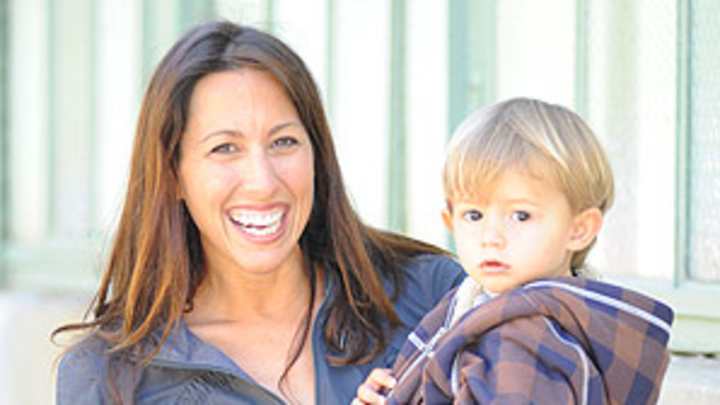Janet Evans returns to the pool with a family and a new mentality

At the 1988 Olympics, Janet Evans, then 16, thrilled the world when defeated the performance-enhanced Germans and won gold medals in the 400m and 800m freestyle, and the 400m individual medley events. Her world records in the three distance freestyle events (400m, 800m, 1500m), all set in the late 1980s, stood untouched through four Olympic Games.
The queen of distance swimming competed in the '92 and '96 Olympics before putting away her competition cap and goggles for good.
However, that all changed in November 2010, when Evans started competitively training again with her old coach, Mark Schubert, in a Masters program. When Evans raced at (appropriately) the Janet Evans Invitational Masters meet in June 2011, her first meet since her retirement, she broke the Masters world records for the women's 40-44 age group in the 400m and 800m freestyle events.
Evans was bit by the bug. At 40 (as of Aug. 28), Evans has her sights set on the U.S. Olympic Trials and, ultimately, the 2012 Olympic team.
"For me, it's always been in the back of my mind to swim again," Evans said. "Now I'm at a place in my life where my kids are settled down, my son is sleeping through the night, and I can focus on [training]. I think for me, it's a personal journey, and it's really about fulfilling something I always wanted to do.
Since the meet in June, Evans has further lowered her 400m freestyle masters world record, less than 4 seconds off the Olympic Trials qualifying time.
Even after her retirement, Evans continued to be one of the most recognized swimmers in the world, especially as no one seemed able to touch her world records. She quickly established herself as one of the top motivational speakers in the United States, and she was inducted into both the Swimming and Olympic Hall of Fames.
"I gained wisdom after the '96 Games," Evans said. "I spent my whole life swimming, and now I had the chance to do things I never could before because of swimming. [...] As a champion, I want to inspire people, especially young people, and I think Olympians are an incredible role model."
Evans also married in 2004 and had children -- a daughter in 2006 and a son in 2009 (she recreationally swam through both of her pregnancies). Of course, she made sure both of her children were familiar with the water at a young age, just like she was. She seemed settled in her life without competitive swimming.
The swimming world has greatly changed since the '96 Olympics. A new kick has been added to the breaststroke underwater pullout. The polyurethane bodysuits left an unfortunate mark on the record books before being banned in 2010 ("I think they level the playing field in a not-so-good way," Evans says). Training schedules have changed with the growing popularity of cross training and yoga-like workouts. Even the way swimmers approach the longer events is different; the 800m freestyle is considered eight 100 meter sprints, as opposed to a longer, paced event, said her agent, Evan Morgenstein. All of these pose obstacles for Evans to overcome, because her competition essentially popularized these changes.
Evans has a goal with a message: to make a comeback to swimming and prove to women around the world that they, too, can return to their life passion, no matter their situation.
"Janet going back speaks volumes to every single woman with a passion, because she is returning to her lifelong passion," Morgenstein said. "The biggest message of her comeback is to show women that they too can return to the passions which they have put off for their whole life."
Just imagine - if Evans returns to the international level in her signature distance events, she will most likely be racing some of the athletes who broke her world records after almost two decades, such as Kate Ziegler of the U.S. and Great Britain's Rebecca Adlington. In swimming, it is rare to see a legend from almost two decades earlier competing against the next wave of young, dominant swimmers -- let alone against those who broke legendary records.
"I admire all of those women, and they've done an amazing job as distance swimmers," Evans said. "They've taken the mantle of distance swimming and really have been spectacular, because there are not many people who want to swim those events."
At just 17 with three gold medals around her neck, Evans did not know where her success was going to take her, but soon enough, she learned her place.
"With age and time, being an Olympic champion becomes more than medals and glory," she said.
